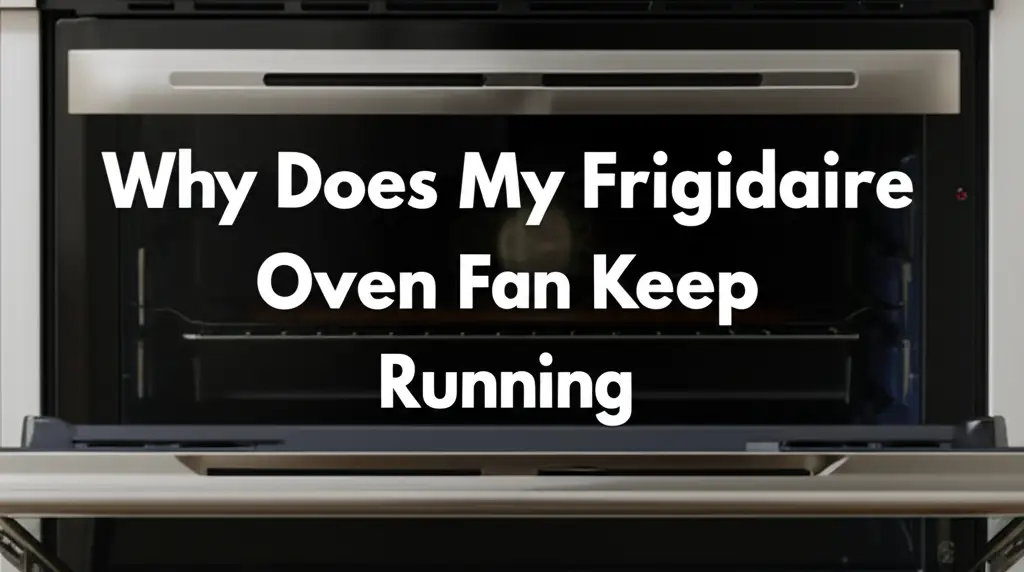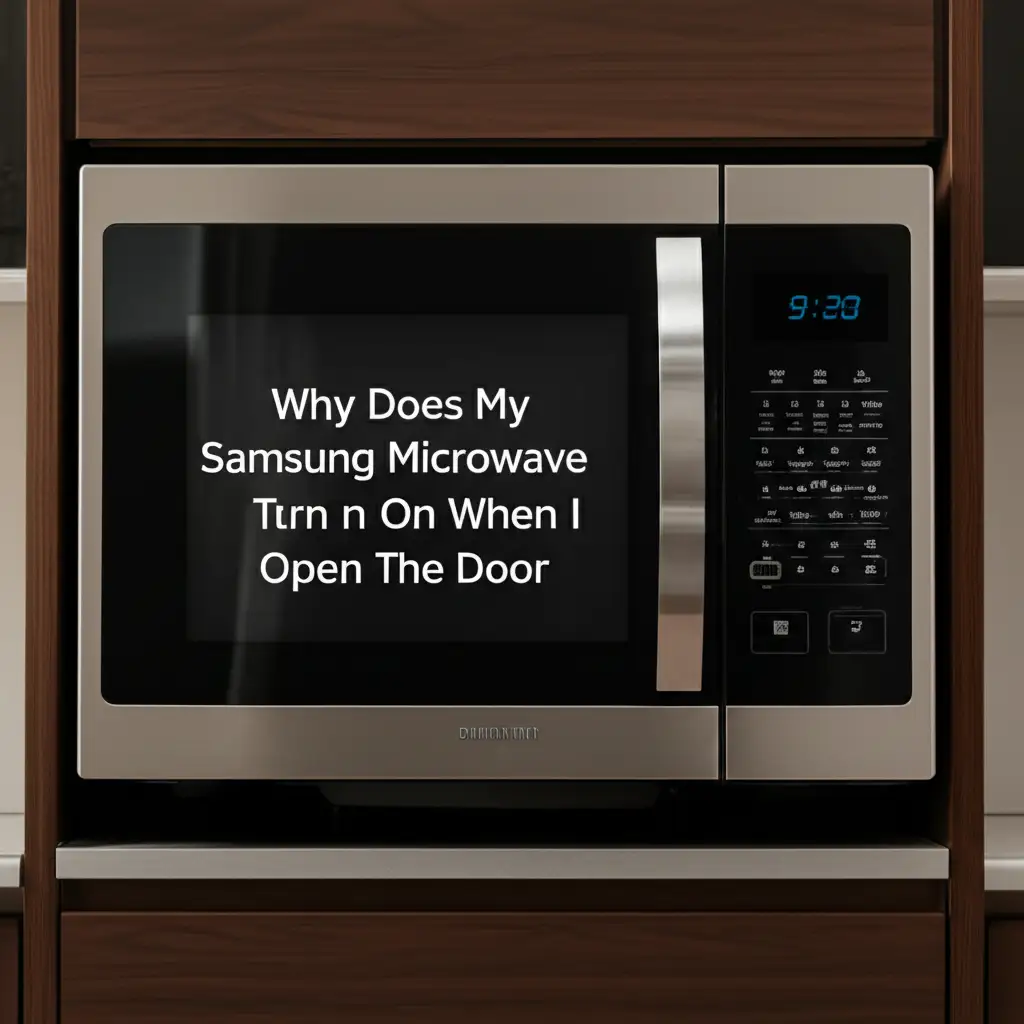· Davia Murnell · Home Maintenance · 16 min read
Why Does My Frigidaire Oven Fan Keep Running

Frigidaire Oven Fan Keeps Running? Here’s Why
It can be quite startling when your Frigidaire oven fan keeps running long after you finish cooking. The continuous hum might make you wonder if something is wrong. I know I’ve felt that concern before. This is a common experience for many oven owners.
Understanding why your oven fan behaves this way helps ease worries. It often involves normal cooling processes or minor issues. In this article, we will explore the typical functions of your Frigidaire oven fan. We will also cover common reasons it might run longer than expected. I will guide you through simple troubleshooting steps to address the problem. You will learn when it is time to call a professional technician.
Takeaway
- Normal Operation: The fan typically runs to cool down the oven after use, especially after high-temperature cooking or a self-clean cycle.
- Common Causes: Reasons for extended fan operation include high heat, self-clean cycle, faulty temperature sensor, or a malfunctioning control board.
- Troubleshooting: Check if the oven is still hot. Allow adequate cooling time. Perform a reset if needed.
- Self-Clean Cycle: The fan must run during and after the self-clean cycle to dissipate extreme heat safely.
- Professional Help: Contact a technician for persistent issues like error codes, unusual noises, or if troubleshooting steps fail.
Why Does My Frigidaire Oven Fan Keep Running?
Your Frigidaire oven fan often keeps running to dissipate residual heat after cooking or using high-temperature functions. This is a normal cooling process designed to protect internal components and the surrounding cabinetry. A fan can also run longer due to a faulty temperature sensor or control board.
Understanding Your Frigidaire Oven’s Cooling Fan System
Have you ever wondered why your oven has a fan that activates when you cook? This fan is not just for convection baking. Most modern ovens, including Frigidaire models, include a cooling fan. This fan protects the oven’s electronic components and surrounding cabinetry from excessive heat. It prevents damage that high temperatures could cause.
The cooling fan starts running when the oven reaches a certain temperature. It continues to operate until the internal temperature drops to a safe level. This is typically below 150-200 degrees Fahrenheit. The fan draws cool air into the oven’s control area. It expels hot air, ensuring sensitive parts like the control board do not overheat. Without this system, your oven could experience premature component failure. I find it reassuring to know this fan is working to keep my appliance safe.
How the Cooling Fan Works
The cooling fan is usually located near the top or back of the oven cavity. It is distinct from the convection fan found in some models, which circulates hot air for even cooking. The cooling fan’s sole purpose is temperature regulation. It activates automatically based on signals from the oven’s temperature sensor.
Once you turn the oven off, the heating elements stop producing heat. However, the oven interior remains very hot. The cooling fan continues to run. It effectively “air-conditions” the oven’s internal structure. This process helps the oven cool down faster. It also prevents heat from building up in the surrounding kitchen cabinets. This is a critical safety and longevity feature for your appliance.
Common Reasons Your Frigidaire Oven Fan Keeps Running
It is normal for your Frigidaire oven fan to run for a period after cooking. However, sometimes it seems to run excessively. This can be puzzling. Several common reasons explain why your fan might keep running longer than expected. Most of these reasons relate to heat management within the appliance.
One primary reason is the residual heat inside the oven. After cooking at high temperatures, like when baking a pizza or roasting a turkey, the oven interior gets very hot. The cooling fan must continue operating until the temperature drops significantly. This process can take anywhere from 15 minutes to over an hour, depending on the cooking temperature and duration. The fan’s job is to ensure proper cooling.
Another common cause is the self-clean cycle. This cycle uses extremely high temperatures to burn off food residues. During and after a self-clean, the oven reaches temperatures far exceeding normal cooking heat. The fan will run for an extended period, often several hours, to safely cool the oven down. This is completely normal behavior for your Frigidaire oven. You can learn more about how long this process takes by reading about how long a Frigidaire oven takes to self-clean.
What if the Fan Runs Constantly?
If your fan runs constantly, even when the oven is cold, this points to a different issue. A faulty temperature sensor might be sending incorrect readings to the control board. The control board thinks the oven is still hot and keeps the fan running. This is not normal and requires attention. I have personally experienced a similar situation with an appliance, and it was certainly frustrating.
Lastly, a problem with the oven’s control board or a relay could cause the fan to run non-stop. The control board acts as the oven’s brain. If it malfunctions, it might incorrectly activate the fan circuit. This is a more serious issue that usually requires professional diagnosis. Sometimes, error codes, such as an F10 error on a Frigidaire oven, can point to control board issues.
The Self-Clean Cycle and Fan Operation
The self-clean cycle is a fantastic feature on many modern ovens, including Frigidaire models. It simplifies the often-dreaded task of cleaning your oven. However, this cycle involves extremely high temperatures, far beyond what you use for regular cooking. Because of these intense temperatures, the oven’s cooling fan plays a crucial role. It must operate continuously during and long after the self-clean cycle to manage the heat safely.
During the self-clean cycle, the oven heats up to temperatures around 800-900 degrees Fahrenheit (427-482 degrees Celsius). This intense heat incinerates food spills and grease. To prevent damage to the oven’s electronic components and the surrounding cabinetry, the cooling fan automatically activates. It helps dissipate the extreme heat from the control panel area. The fan works to keep sensitive parts cool throughout this high-temperature process.
After the self-clean cycle finishes, the oven remains incredibly hot. The fan will continue to run for several hours. This extended operation is entirely normal and necessary. It allows the oven to cool down gradually and safely to room temperature. You should not try to open the oven door or force it to cool faster during this time. The oven door typically locks during the self-clean cycle for safety reasons, and it will remain locked until the internal temperature drops to a safe level. This is a vital safety measure.
Expect Extended Fan Operation Post-Self-Clean
Do not be alarmed if your Frigidaire oven fan runs for an unusually long time after a self-clean cycle. It is performing its intended function. The duration depends on how hot the oven got and how long the cycle ran. This cooling process can take anywhere from two to five hours, or even longer in some cases. Allowing the fan to complete its job ensures the longevity of your oven and prevents potential damage from overheating. Patience is key during this period. Understanding this normal behavior can save you from unnecessary worry or a service call.
Diagnosing a Faulty Temperature Sensor
If your Frigidaire oven fan keeps running even when the oven is completely cold, a faulty temperature sensor is a likely culprit. The temperature sensor, also known as an oven probe or thermostat, is a critical component. It monitors the internal temperature of the oven cavity. This sensor sends temperature readings to the oven’s control board. The control board uses these readings to regulate heating elements and manage the cooling fan’s operation.
When a temperature sensor malfunctions, it can send inaccurate readings. For example, it might incorrectly tell the control board that the oven is still very hot, even if it is not. In response, the control board will keep the cooling fan activated. This creates a cycle where the fan runs continuously, despite the oven being cool to the touch. This can be frustrating because the oven seems fine otherwise, but the constant hum is annoying. I once had a similar issue with a different appliance, and a small sensor was indeed the cause.
Symptoms of a Bad Temperature Sensor
- Fan runs constantly: The most obvious sign is the fan running non-stop, even hours after the oven has cooled down.
- Inaccurate oven temperatures: Your oven might not heat to the set temperature, or it might overheat. This can lead to burnt or undercooked food. For example, if your Frigidaire oven is not getting up to temperature, a faulty sensor is a strong possibility.
- Error codes: Some Frigidaire models display specific error codes related to sensor failures. Check your oven’s manual for a list of error codes.
- Long preheat times: If the sensor gives a low reading, the oven might take much longer to preheat.
You can sometimes test a temperature sensor with a multimeter to check its resistance. However, replacing a faulty sensor usually requires disassembling part of the oven. This job is often best left to a qualified appliance technician. A professional can accurately diagnose the issue and replace the sensor correctly.
Issues with the Control Board or Relay
When your Frigidaire oven fan keeps running and all other common causes are ruled out, the issue might lie with the control board or a specific relay. The control board, often called the main control board or electronic control board, is the “brain” of your oven. It manages all the oven’s functions, from temperature regulation to fan operation and displaying error codes. If this board malfunctions, it can send incorrect signals.
A faulty control board might mistakenly keep the cooling fan activated. This happens even when the oven is completely cool. The internal circuitry could be damaged, or software glitches could occur. Such issues can lead to the fan running indefinitely. This is a less common problem than a sensor issue. However, it is a more complex repair. Replacing a control board is usually an expensive fix.
The Role of Relays
Within the control board, or sometimes as separate components, are relays. Relays are essentially electrical switches. They control the flow of power to various oven components, including the cooling fan. A relay can get stuck in the “on” position. This means it continuously sends power to the fan motor. Even if the control board sends a “fan off” signal, a stuck relay will override it. This results in constant fan operation. This is similar to how a light switch might get stuck.
Diagnosing a bad control board or relay requires specialized knowledge and tools. You cannot easily test these components at home without electrical expertise. If you suspect a control board or relay issue, it is time to call a professional technician. They can perform diagnostic tests to pinpoint the exact problem. Trying to repair these components yourself can be dangerous. It might cause further damage to your oven.
Troubleshooting Steps for a Persistent Fan
When your Frigidaire oven fan keeps running, it can be annoying. Before calling a technician, you can try a few troubleshooting steps. These actions might resolve the issue quickly. They could also help you narrow down the problem. I always start with the simplest solutions first.
1. Allow Ample Cooling Time: First, ensure you have given the oven enough time to cool down. After baking at high temperatures or using the self-clean cycle, the fan can run for an hour or more. This is normal. If you just finished cooking a big meal, wait for at least an hour. The fan should eventually stop. Patience is key here.
2. Perform a Hard Reset: A hard reset can sometimes clear a minor electronic glitch. This is like rebooting your computer.
- Locate your home’s circuit breaker box.
- Find the breaker labeled for your kitchen or oven.
- Turn the breaker off for at least 5-10 minutes.
- Turn the breaker back on.
- Check if the fan stops running. This simple step often resolves many electronic appliance issues.
3. Check for Obstructions: While less common for a constantly running fan, sometimes obstructions can affect airflow. This might cause the oven to take longer to cool.
- Ensure the oven’s vents (usually at the back or top) are not blocked.
- Make sure there is proper clearance around the oven.
- A blocked vent might make the fan work harder and longer.
4. Verify Oven Door Closure: Ensure the oven door is completely closed and latched. Some Frigidaire models have safety switches. If the door is not fully closed, the oven might believe it cannot cool properly. This could affect fan operation. While less common, sometimes an open door prevents normal operation, as seen with ovens that turn off when the door opens.
5. Observe for Error Codes: Look at your oven’s display for any error codes. Error codes are crucial clues. They can indicate specific component failures, like a bad temperature sensor (e.g., F30, F31) or control board issues (e.g., F10). Refer to your Frigidaire oven’s user manual to interpret any codes you see. This information will be invaluable if you need to call a professional.
If these troubleshooting steps do not resolve the issue, the problem might be more complex. It could involve a faulty temperature sensor, control board, or relay. At this point, it is usually best to seek professional assistance.
When to Call a Professional for Your Frigidaire Oven
Knowing when to call a professional technician for your Frigidaire oven is important. While some fan issues are normal or easily fixed, others require expert intervention. Your safety and the longevity of your appliance depend on it. Do not hesitate to seek help if you are unsure or uncomfortable performing a repair yourself.
You should call a professional if:
- The fan runs constantly even when the oven is cold. This indicates a likely sensor or control board issue. These parts are complex and can be expensive to replace. A professional has the right tools and knowledge to diagnose them correctly.
- You see error codes on the display. Error codes are the oven’s way of telling you what is wrong. If your manual does not provide a clear solution, a technician can interpret the code. They can then perform the necessary repair. An example is the F10 error on a Frigidaire oven, which often points to a control board issue.
- The fan makes unusual noises. If the fan is screeching, grinding, or buzzing loudly, its motor or bearings might be failing. Continued use could lead to further damage. A technician can replace the fan motor assembly. This is not a common cause for a fan running constantly, but it is a reason for concern.
- The oven is not heating correctly. If the fan runs but the oven is not getting up to temperature, or it overheats, the temperature sensor is likely faulty. This also suggests a need for professional repair. For example, if your Frigidaire oven is not getting up to temperature, it is best to call a professional.
- You are uncomfortable with electrical repairs. Oven repairs involve working with electricity. This can be dangerous if you lack experience. A professional technician is trained to safely handle electrical components.
- Troubleshooting steps failed. If you have tried all the recommended troubleshooting steps and the fan still keeps running, it is time for an expert diagnosis. They can quickly identify and fix the underlying issue.
Investing in a professional repair can save you money in the long run. It prevents potential further damage from incorrect DIY fixes. It also ensures your appliance operates safely and efficiently. Just like a Bosch oven fan might need professional attention for similar issues, your Frigidaire oven benefits from expert care.
FAQ Section
How long should a Frigidaire oven fan run after cooking?
A Frigidaire oven fan typically runs for 15 to 45 minutes after cooking. This duration depends on the cooking temperature and how long the oven was on. After high-temperature cooking or extended use, it is normal for the fan to run longer. This is part of the oven’s cooling process to protect its components from heat.
Is it normal for the fan to run during a self-clean cycle?
Yes, it is completely normal and necessary for the fan to run during and after a self-clean cycle. The self-clean cycle uses extremely high temperatures. The fan must operate continuously for several hours to dissipate this intense heat safely. It protects the oven’s electronics and surrounding cabinetry.
What if my Frigidaire oven fan is noisy while running?
If your Frigidaire oven fan is noisy, making grinding or rattling sounds, it might indicate an issue with the fan motor or its bearings. The fan could be worn out or have something caught in it. While not directly related to constant running, unusual noise suggests a need for inspection. It might require professional repair or replacement.
Can I stop the oven fan from running?
You should not try to stop the oven fan from running if it is due to normal cooling or a self-clean cycle. The fan is a safety feature. It protects your oven’s components from overheating. If the fan runs constantly when the oven is cold, and after a reset, you need to diagnose the underlying electrical issue. Do not manually stop the fan.
Does a running oven fan use a lot of electricity?
An oven cooling fan uses relatively little electricity compared to the heating elements. It is a small motor. While a constantly running fan will consume more electricity than one that turns off, the increase in your electric bill from just the fan is usually minimal. The main concern is diagnosing the underlying fault.
How do I reset my Frigidaire oven to stop the fan?
To reset your Frigidaire oven, locate the circuit breaker that supplies power to the oven in your home’s electrical panel. Flip the breaker to the “off” position. Wait for 5 to 10 minutes, then flip the breaker back to the “on” position. This hard reset can sometimes clear electronic glitches that cause the fan to run continuously.
Conclusion
It can certainly be unsettling when your Frigidaire oven fan keeps running. I understand that feeling of uncertainty. However, much of the time, this is a normal function of your appliance. The fan works hard to cool down the oven after cooking or, especially, after a self-clean cycle. This cooling process protects the oven’s sensitive electronics and ensures its longevity.
We have explored the common reasons behind a persistent fan. These include normal cooling, the self-clean cycle, and potential issues like a faulty temperature sensor or control board. I hope the troubleshooting steps provided empower you to diagnose the problem. Remember to allow sufficient cooling time and try a hard reset first. This often resolves minor glitches.
If the fan continues to run when the oven is cold, or if you notice error codes or unusual noises, it is time to call a professional. Appliance technicians have the expertise to safely diagnose and repair complex electrical issues. Prioritize your safety and the health of your appliance. By understanding your oven’s behavior, you can either fix the issue yourself or know when to seek expert help, ensuring your Frigidaire oven continues to serve you well.
- Frigidaire oven fan
- oven repair
- cooling fan
- appliance troubleshooting
- oven issues
- self-clean cycle
- temperature sensor





